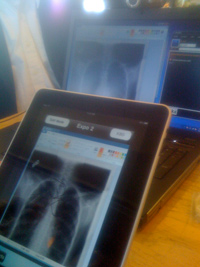 Varaha Systems of Dallas TX, was originally founded in 2003 as a public safety application of fixed-mobile convergence providing session persistence for police car and other classes of users crossing the WiFi/cellular boundaries of municipal WiFi networks.
Varaha Systems of Dallas TX, was originally founded in 2003 as a public safety application of fixed-mobile convergence providing session persistence for police car and other classes of users crossing the WiFi/cellular boundaries of municipal WiFi networks.
In October 2008, the company introduced uMobility, a client-server software product for mobile UC. The uMobility client software supports a widening range of mobile devices. The controller software is supported on standard 2U servers, typically available for enterprise and service provider data center applications. Clients and servers work together to decide when to use which networks and to manage context of calls in progress, to define call treatment options or to pass signaling data between the mobile user and the controller.
In the 10 short months since initial release, the company has made substantial progress in supporting a wide range of popular smartphones. uMobility clients are available for leading dual mode devices such as the iPhone, Nokia E-series, N-series and Windows Mobile 5 or 6 devices, WiFi only devices such as the iPod Touch, and leading cellular-only devices such as the BlackBerry which is in trials now, slated for release in fall 2009. Plans for Android or Palm Pre support are being driven by customer requests at this time.
The server software controlling the client services has been packaged for CLECs, ITSPs and IOCs through its supported interoperability and joint marketing with MetaSwitch, BroadWorks, VocalData and Nortel MCS and its relationship with Tacqua which OEMs the software and integration as MobileWorks. In these implementations, the uMobility controller supports the service provider with multi-tenant service allowing multiple enterprises to have secure access to their partition where they can apply their unique dialing plans, features and configuration options.
In a climate where landlines are increasingly being disconnected, carriers need to integrate those capabilities into the mobile service as a method to stave off and slow down the rate of disconnects. uMobility enables landline service providers to provide value for the mobile context of their users. Participating in mobile calls that were aimed at the VoIP endpoint but delivered to the mobile device allows for single voicemail, call transfer and reduced wireless minutes since some calls will be handled on the WiFi network and not necessarily on the mobile carrier operations.
Similarly, mobile operators can use uMobility to extend their numbering plan and features onto landline services and landline endpoints.
Ed Cox, the VP Carrier Sales and Marketing explained that some ITSPs see mobile UC services as a standard part of the VoIP service and therefore use the service to differentiate themselves from their ‘less-converged’ service competition, or those that charge extra for these popular capabilities. They need to make the functionality available to every subscriber, and it’s not just for business users.
For business too
Enterprise-wise, Varaha has developed integrations with Avaya, Cisco, Nortel, Asterisk and Vertical where the rapidly developing reseller community of Varaha solutions bring standard servers, the uMobility controller software and call control integration know-how together to mobile-enable the customers’ favorite call control implementation. Toshiba has taken the software one step farther by OEM’ing the uMobility solution and integrating it directly into the Strata CIX-series IP PBX, extending Toshiba enterprise call control features over the WiFi and cellular environments.
Since the controller is engaged in the call control and in some circumstances the media path, the use of DTMF codes to activate mid-call features is a practical option.
The company’s WiFi-cellular and cellular-WiFi call handoff technology is called Service Quality Awareness. The patented technique uses four criteria to assess the necessity for a handoff, including signal strength and voice quality. The client-controller collaborate to make a decision and when affirmative, the controller initiates a call to the mobile device using the other radio. The automatically answered call is applied with a ‘Make Before Break’ test and then handed off. Users are usually unaware that they’ve been handed off to another network.
Varaha’s approach to mobile UC for ITSPs is somewhat unique in North America. By engaging the ITSP centered on business users, the uMobility solution provides a way for hosted VoIP service providers to accelerate their market penetration with a more complete value proposition than the alternative of typical enterprise IP PBX deployments. Broadening the ITSPs offer to include value for mobile users differentiates the mobile ITSP from their less-converged service provider competition and allows them to show how they can enable mobile UC services, lower cellular charges and position the uMobility service as the future of enterprise telephony. So, it’s not just a one-for-one (leased versus buy) comparison. It’s one-for-one on most items, except the uMobility hosted offer is organized to support mobile communications as the future of enterprise communications, all for a low monthly fee.









